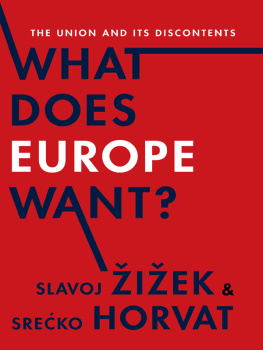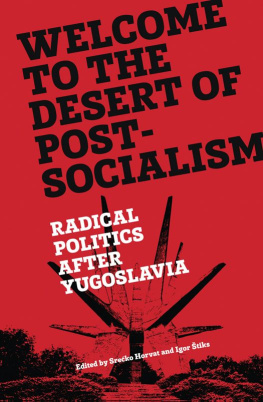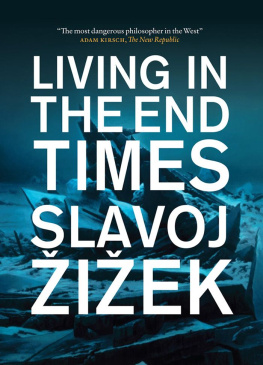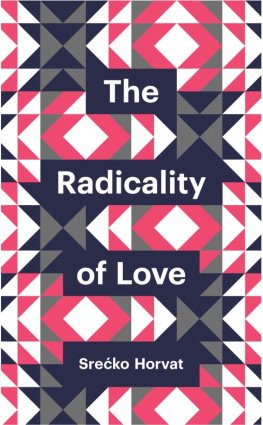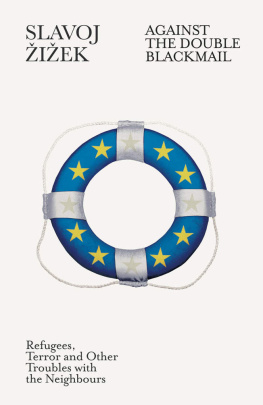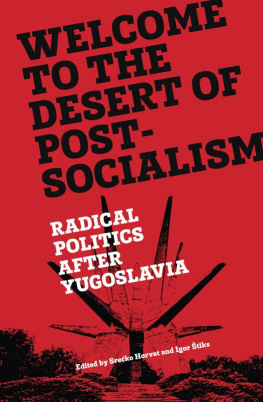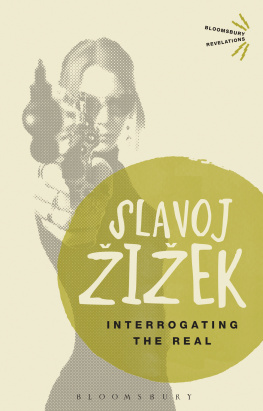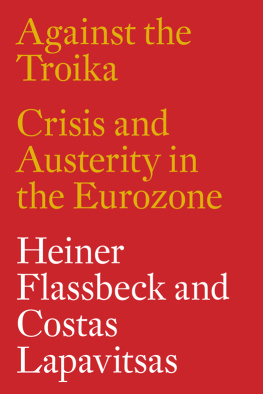WHAT DOES EUROPE WANT?
Insurrections
Critical Studies in Religion, Politics, and Culture
Insurrections
Critical Studies in Religion, Politics, and Culture
Slavoj iek, Clayton Crockett, Creston Davis,
Jeffrey W Robbins,
EDITORS
The intersection of religion, politics, and culture is one of the most discussed areas in theory today. It also has the deepest and most wide-ranging impact on the world. Insurrections: Critical Studies in Religion, Politics, and Culture will bring the tools of philosophy and critical theory to the political implications of the religious turn. The series will address a range of religious traditions and political viewpoints in the United States, Europe, and other parts of the world. Without advocating any specific religious or theological stance, the series aims nonetheless to be faithful to the radical emancipatory potential of religion.
For a list of titles in this series, see .
WHAT DOES EUROPE WANT?
The Union and Its Discontents
SLAVOJ IEK
SREKO HORVAT
Columbia University Press
New York
Columbia University Press
Publishers Since 1893
New York Chichester, West Sussex
cup.columbia.edu
Copyright 2015 Columbia University Press
All rights reserved
E-ISBN 978-0-231-53841-1
ISBN 978-0-231-17106-9 (cloth : alk. paper)
ISBN 978-0-231-17107-6 (pbk. : alk. paper)
ISBN 978-0-231-53841-1 (e-book)
Library of Congress Control Number : 2014938780
A Columbia University Press E-book.
CUP would be pleased to hear about your reading experience with this e-book at .
Cover design by Chang Jae Lee
References to websites (URLs) were accurate at the time of writing. Neither the author nor Columbia University Press is responsible for URLs that may have expired or changed since the manuscript was prepared.
CONTENTS
From the middle of the 1990s until almost the end of the first decade of the twenty-first century, Greece tended towards economic growth. The main characteristics of that growth were the very large and non-taxed profits enjoyed by the rich, along with over-indebtedness and the rising unemployment among the poor. Public money was stolen in numerous ways, and the economy was limited mainly to the consumption of imported goods from rich European countries. Rating agencies considered this model of cheap money, cheap labour the model of dynamic emerging economies.
The Vicious Cycle of Depression
Everything, however, changed after the 2008 crisis. The cost of the bank losses that were created by uncontrolled speculation were transfered to national governments, which were in turn transferred to society at large. The flawed model of Greek development collapsed and the country was deprived of the opportunity to borrow, causing it to become dependent on the IMF and the European bank. And all this was accompanied by an extremely severe austerity programme.
This programme, which the Greek government adopted without proper debate, consists of two parts: stabilisation and reform. The conditions of the programme are presented as positive, in order to cover up the huge social destruction it has caused. In Greece, the part of the programme named stabilisation leads to indirect, destructive taxation, large cuts in public spending and the destruction of the welfare state, especially in the areas of health, education and social security, as well as the privatisation of basic social goods, such as water and energy. The programme which forms part of the reform deals with the simplification of redundancy procedure, the elimination of collective agreements and the creation of special economic zones. This is accompanied by many other regulations designed to facilitate the investment of powerful and colonialist economic forces, without the inconvenience of, say, having to go all the way to South Sudan. These are just some of the conditions that are in the Memorandum, the contract that was signed by Greece with the IMF, the European Union and the European Central Bank.
These measures are naturally supposed to lead Greece out of the crisis. The strict stabilisation programme should lead to budget surpluses, allowing the country to stop borrowing, while at the same time enabling it to pay off the debt. On the other hand, the reforms are aimed at regaining market confidence, encouraging them to invest after witnessing the destroyed welfare state and the desperate, insecure and low-paid workers in the labour market. This would lead to new development; something which does not exist anywhere except in holy books and the perverted minds of global neoliberalism.
It was assumed that the programme would be very effective and fast, and that Greece would soon be reborn and back on the path of growth. But three years after the signing of the Memorandum, the situation is becoming worse. The economy is sinking further, and the taxes are obviously not collected, for the simple reason that the Greek citizens are unable to pay them. The reduction of spending has now reached the core of social integrity, creating the conditions of a humanitarian crisis. In other words, we are now talking about people who are reduced to eating rubbish and sleeping on the pavements, about pensioners who can not afford to buy bread, of households without electricity, of patients who are unable to afford medicine and treatment. And all this within the eurozone.
Investors, of course, do not come, given that the current bankruptcy option remains open. And of course, the authors of the Memorandum after each tragic failure, react by imposing more taxes and more cuts. The Greek economy has entered a vicious cycle of uncontrolled depression that leads nowhere except to complete disaster.
Taliban Neoliberalism
The Greek rescue plan (another convenient term used to describe this disaster) ignores a fundamental principle. The economy is like a cow: it eats grass and produces milk. It is inconceivable to take away a quarter of her grass and expect her to produce four times more milk. The cow will simply die. The same is now happening to the Greek economy.
The Greek Left realised, from the very first moment, that the austerity measures would not cure, but actually deepen the crisis. When someone is drowning, he needs to be thrown a lifeline, not a weight. For their part, the Taliban neoliberalists still assure us that things will improve. Yet even the most stupid among them must now know that this is a lie. But this stance is not nonsense, and its not dogmatism. The leaders of the IMF themselves recently stated that there is an error in the design of the Greek austerity programme, which is doomed to failure, and that the effects of the recession are completely out of control. And yet the programme continues with an unprecedented stubbornness and persistence, and the situation is becoming more and more difficult. The conclusion can only be that something else lies behind all this.
In fact, behind all this is the fact that pulling the Greek economy out of the crisis is not in the interests of Europe or the IMF. Much more important is the desire to remove, as the ultimate goal of the programme, what in post-war Europe became known as the social contract. The fact that Greece will be left bankrupt and riddled with social problems is not important. What is important, is that a eurozone country is openly discussing the introduction of a wage level comparative to that of the Chinese, along with the abolition of workers rights, the abolition of national insurance and the welfare state, and the total privatisation of utilities and public goods. Those neoliberal depraved minds, who already encountered violent resistance in European societies following the decade of the 1990s, now find their dream becoming a reality through the pretext of the crisis.

